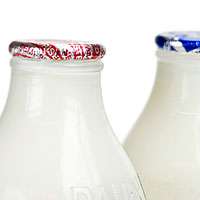Milk proteins may protect against cardiovascular disease

The Maillard reaction is a chemical reaction between amino acids and reducing sugars that results in browned foods like seared steaks and toasted bread. When proteins and sugars are mixed together and heated, new chemical compounds are formed. Some are responsible for new flavors and some, according to a new study published in the Journal of Dairy Science, may protect us against cardiovascular disease.
Researchers at the R&D Center, Seoul Dairy Cooperative, the College of Life Science & Biotechnology, Korea University, and the BK21 Plus Graduate Program, Department of Animal Science and Institute Agricultural Science & Technology, Chonbuk National University in South Korea, have determined that dietary compounds formed in milk-based products lowered serum total and low-density lipoprotein (LDL) cholesterol levels and triglycerides in mice. These compounds also protected against acute pulmonary thromboembolism as well as aspirin, but without the possible bleeding consequences often observed in aspirin therapy.
Whey protein concentrate and sodium caseinate were heated with lactose to form whey-protein Maillard reaction products (wMRP). Lactic acid bacteria were then used to produce fermented MRPs (f-MRP). Sodium caseinate alone was also reacted to form Maillard-reacted sodium caseinate (cMRP) and further fermented to f-cMRP.
To determine antithrombotic effects, 60 mice were divided into four treatment groups of 15. Group one received phosphate buffered saline (PBS) (negative control), group two received aspirin (positive control), group three received wMRP, and group four received f-MRP in addition to a normal diet. Assessment of antioxidant activity and cholesterol reduction effect of fermented cMRP was done with another group of 60 mice fed various diets with and without f-cMRP.
'This is the first report describing the verification for the impacts of MRPs and their fermented product in cardiovascular risk using animal model,' explained lead investigator Younghoon Kim, Ph.D., of the Department of Animal Science, Chonbuk National University, Republic of Korea, 'In addition, our findings represent a real advance in the area of milk proteins and indicate that f-cMRP and cMRP could be recommended for use as potential antioxidants and cardioprotective ingredients for various functional, pharmaceutical, and dairy applications.'
Matt Lucy, Ph.D., Editor-in-Chief, Journal of Dairy Science, and Professor of Animal Science, University of Missouri, added, 'We are beginning to understand that dairy products provide benefits to human health beyond the traditional nutrients. This study performed in laboratory animals demonstrates the potential for milk proteins found in naturally fermented foods to improve human cardiovascular health.'
More information: 'Dietary maillard reaction products and their fermented products reduces cardiovascular risk in animal model,' by N. S. Oh, M. R. Park, K. W. Lee, S. H. Kim, Y. Kim, DOI: dx.doi.org/10.3168/jds.2015-9308, Journal of Dairy Science, published online in advance of Volume 98, Issue 8 (August 2015)

















